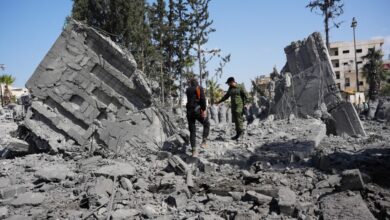UK gives Jordan £5 million in equipment originally destined for Syria’s moderate opposition
The United Kingdom is reallocating more than £5 million ($6.6 million) in vehicles and equipment to the Jordan Armed Forces that were originally planned for Syrian ‘moderate armed opposition’ forces in Syria, according to a government statement this week.
“The U.K. intends to grant to the Jordanian Armed Forces a number of vehicles and other equipment, acquired for the MAO’s border forces in southern Syria but now unable to be delivered to them,” Foreign Secretary Jeremy Hunt said in a statement to Parliament on Wednesday, September 12.
The equipment includes unarmored vehicles, day and night observation devices, “detectors to find and avoid improvised explosive devices,” uniforms, medical packs, radios and load carrying/protective vests totaling £5,061,028.46, according to the foreign secretary.

The U.K. was providing support for security along the Jordan-Syria border to thwart would-be smugglers and Islamic State fighters. It has supported anti-Assad rebels since the first days of the Syrian civil war.
But since July, the U.K. has been unable to provide additional support to the MAO due to the security situation, Hunt said.
“We intend, therefore, to re-direct existing resources to improve the security of Jordan’s borders from within Jordan itself,” Hunt said.
“This option is most cost-effective to the taxpayer given that the vehicles are already stored in Jordan,” he added.
On July 19, 10 days after he took over the foreign secretary post from Boris Johnson, Hunt told Parliament that the U.K. would help the Jordanian police and Gendarmerie develop community policing, critical incident response and “investigative counter-terrorist policing capabilities” to the tune of £9 million over two years.
The U.K. previously gave Jordan £2.5 million in non-lethal equipment for border security in 2015 to counter threats from ISIS.
In March, Jordan and the U.S. launched a new center to boost counter-terrorism training for regional forces. The kingdom can also receive U.S. funds through the Pentagon “Counter-ISIS Train and Equip Fund,” which requests $250 million for border security in Fiscal Year 2019.
Syrian opposition support
Last month, the Guardian reported that the U.K. government would end its funding for the Access to Justice and Community Service program, a Syrian opposition policing scheme deemed too risky to continue in rebel-held areas.
According to a BBC investigation last year, jihadist elements had become influential in the U.K.-supported police forces in Aleppo, Dara’a and Idlib provinces and money earmarked for the “Free Syrian Police” had instead ended up in the hands of the al-Qaeda affiliated al-Nusra Front.
Adam Smith International, one of the organizations that implemented the AJACS project, has said it rejects the allegations in the BBC report.

All but Idlib have since fallen to the regime, with thousands of civilians and rebels fleeing to the northwestern province, which is widely believed to be under threat of imminent attack from Syrian government forces backed by Russian air power.
More than half of Idlib is controlled by jihadists from Hayat Tahrir al-Sham, while much of the rest is held by anti-Assad rebels backed by Turkey.
The number of jihadists in Idlib is not entirely known, the province is hundreds of miles north of the Jordanian border and there is little chance of them infiltrating Jordan when the assault begins.
Jordan border security
However, security of the tri-border area remains a concern to Jordan and Israel. On August 2, the Jordanian army said it killed “a gang of” ISIS fighters trying to infiltrate from the Yarmouk basin in southwest Syria. The next day, Israel said it launched an airstrike on armed ISIS fighters along its own border area in the Golan Heights, killing seven.

To the north and east, the U.S. still maintains a base a few miles north of the Syria-Jordan-Iraq border area in the desert, where it trains the sole remaining Syrian vetted opposition group, Jaysh Maghawir al-Thawra (MaT).
MaT has come under ISIS attack several times inside the 55-km Tanf deconfliction zone, which is surrounded by regime-controlled areas.
On Thursday, Reuters reported that Jordanian and Syrian officals had held the first technical talks on opening the Nassib border crossing, a major route of overland trade for the Gulf and Europe. Jordanian Foreign Minister Ayman Safadi had said only a month earlier that “matters have to stabilize” before such discussions could be held.











